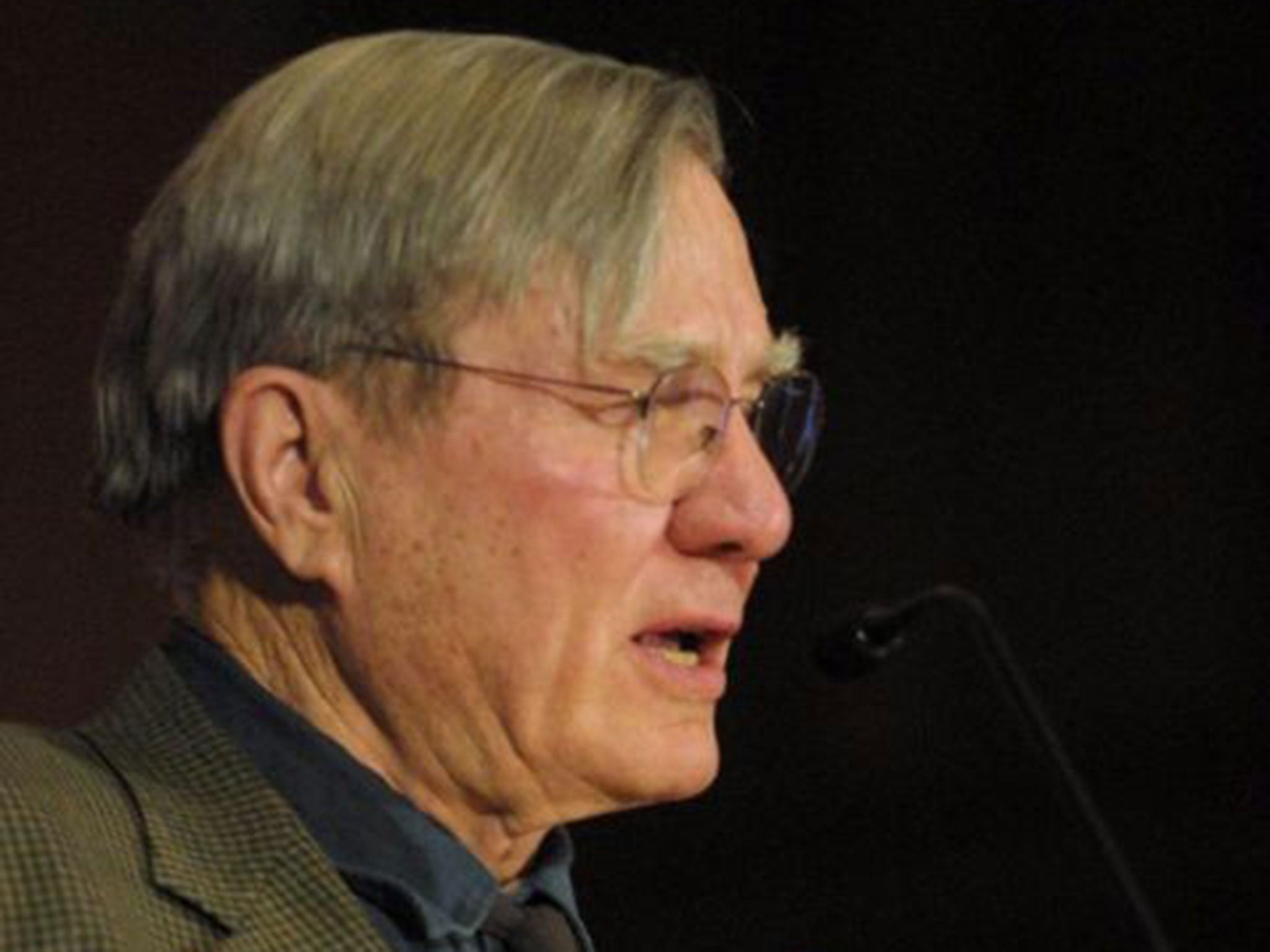Galway Kinnell: Pulitzer Prize-winning US poet whose accessible, intensely human work covered family, illness and the ravages of war
Kinnell expressed terror, he expressed profound awe at our existence

Galway Kinnell was a Pulitzer Prize-winning American poet, whose work explored the themes of nature, religion and human rights and connected the experiences of daily life to larger forces. He is credited with opening up American poetry from the cerebral wit of the 1950s to the more liberated, political work of the 1960s and beyond through his forceful, spiritual takes on the outsiders and the underside of contemporary life.
In a career spanning five decades, Kinnell wrote more than a dozen books of poetry, one of which, Selected Poems (1982), won the 1983 Pulitzer Prize and also a share of the National Book Award with Charles Wright. This tome of work pushed deep into the heart of human experience in the decades after the Second World War. Shortly after these awards, he won a prestigious MacArthur Foundation grant.
Kinnell was part of a generation of poets who were trying to write verse that, as he said, “could be understood without a graduate degree”. He was not afraid to explore the full range of emotion in his poetry, mixing the beauty of words with the harshness of social and political struggle. One contemporary said of him, “He expresses terror, he expresses profound awe at human existence, and regret... It would be limiting for us to confine him merely as a protest poet or a poet of the heart or a Romantic poet. Maybe that’s part of his allure, that he captures the full range of human emotions.”
Born in 1927 in Providence, Rhode Island on America’s north-eastern seaboard, Kinnell was one of four children. His Scottish father, James, was a carpenter and his Irish mother, Elizabeth, a homemaker. He grew up in the small, sleepy town of Pawtucket. He was influenced by the surroundings of his youth, but was also heavily shaped by his experiences as an adult. A self-confessed introvert, as a child he grew up reading reclusive American writers such as Edgar Allan Poe and Emily Dickinson, among others. He recalled, “I was a very silent child, almost mute... Gradually I felt that if I was ever going to have a happy life, it was going to have to do with poetry.”
Following two years in the US Navy during the Second World War, Kinnell attended Princeton, where he was roommates and good friends with the future US Poet Laureate W S Merwin, who introduced him to the works of W B Yeats.
Merwin described his relationship with Kinnell as “like brothers” and remembered his friend as a “very generous soul”. He also praised the poet’s work as “warm-hearted” and the creations of “someone who was independent but felt sympathy with other people.”
In 1948 Kinnell earned a BA with the highest honours and the following year completed his MA at Rochester University. He then worked at the University of Chicago. Thereafter, Kinnell worked in Europe, serving as Fulbright Professor at the Universities of Grenoble, Nice, Sydney and Tehran. The latter spawned the writing of his only novel, Black Light, a tale of an Iranian carpet-mender whose life is changed by a murder.
Kinnell’s breakthrough poem came in 1960, with The Avenue Bearing the Initial of Christ into the New World. Drawing inspiration from TS Eliot’s The Waste Land, this is a 14-part work about Avenue C in Manhattan and the people that walked the street.
On his return to the US in the 1960s, Kinnell was inspired by the Civil Rights Movement and joined CORE (Congress of Racial Equality) and worked on voter registration and workplace integration in Hammond, Louisiana. In 1963 he was arrested and thrown in jail for a related incident. In 1968, he signed the Writers and Editors War Tax Protest pledge, vowing to refuse tax payments in protest against the Vietnam War.
These experiences led to his critically acclaimed book-long poem The Book of Nightmares (1971), which opens with the birth of his first child and closes with the birth of his second, and confronts, among other things, the Vietnam War: “Lieutenant! This corpse will not stop burning.” Nine years later, Mortal Acts, Mortal Words (1980) was published, representing a shift in Kinnell’s concerns, with images from his private life, and with a lighter tone and looser style.
The themes of Kinnell’s poetry were diverse, covering the natural world – illustrated in the acclaimed “The Bear”, the tale of a hunter who comes to identify with his prey – family (“After Making Love We Hear Footsteps”) and illness (“Parkinson’s Disease”).
Kinnell taught at many universities, including Reed College and New York University. From 2001-07, he served as chancellor of the poets academy. He served as Poet Laureate for Vermont from 1989-93, and moved there in 2005.
In 2001 he published a retrospective collection, A New Selected Poems, and his final book, Strong is Your Hold (2006), featured the notable “When the Towers Fell”, about the September 11, 2001 terrorist attacks in New York.
Galway Kinnell, poet: born Rhode Island, New England 1 February 1927; married first 1965 Ines Delgado de Torres (two children, divorced), second 1997 Barbara Bristol; died Sheffield, Vermont 28 October 2014.
Subscribe to Independent Premium to bookmark this article
Want to bookmark your favourite articles and stories to read or reference later? Start your Independent Premium subscription today.

Join our commenting forum
Join thought-provoking conversations, follow other Independent readers and see their replies